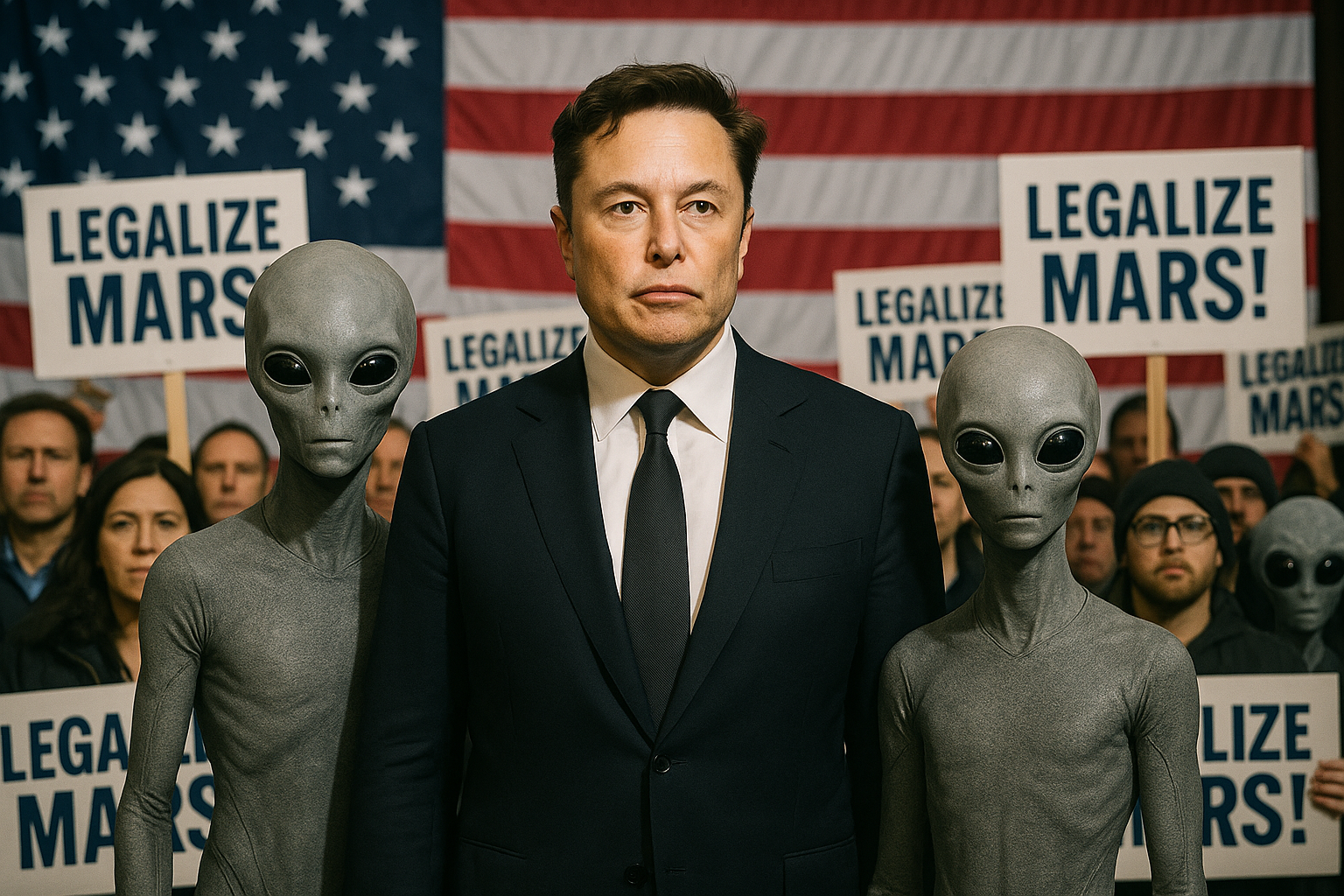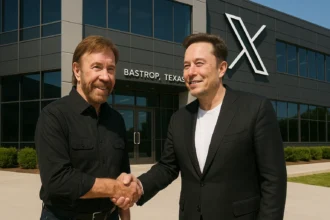In an unprecedented move that blurs the lines between science fiction and political reality, tech billionaire Elon Musk has announced the formation of a new political party called A.M.E.R.I.C.A. (Alliance for Multiplanetary Equality, Rights, Immigration & Citizenship), promising to grant U.S. citizenship to intelligent extraterrestrial beings by the year 2030. While many have dismissed previous Musk ventures as ambitious, this latest initiative appears to be a serious bid to reshape the future of planetary diplomacy—alien diplomacy, to be precise. With a headquarters floating just offshore near Texas, and claims of negotiations with Galactic Federations via Starlink, Musk’s announcement has sparked both intrigue and incredulity across the political spectrum.
The party’s platform is as bold as it is bizarre: “We believe in equality not just among humans, but among all intelligent lifeforms capable of contributing to our shared galactic future,” Musk stated during the debut press conference. “There’s no reason to discriminate based on species, tentacle count, or gravity preference. If an alien is intelligent and wants citizenship, they should have it.” Supporters of the plan argue this could usher in a new era of interstellar cooperation, while detractors see it as an elaborate publicity stunt or, worse, a sign that Musk has finally gone fully extraterrestrial himself. Meanwhile, a recent poll indicates that 73% of Generation Z voters support this move, with some citing “the future is cosmic” as their reasoning. As the U.S. grapples with the implications of this galactic gamble, the political universe may never be the same.
The launch of A.M.E.R.I.C.A. has ignited a firestorm of reactions from politicians, pundits, and conspiracy theorists alike. Republican figures have dismissed the plan as “lunacy,” with one senator commenting, “I’m not debating a lizard from Alpha Centauri on C-SPAN.” Democrats have shown a mix of bewilderment and cautious curiosity, with some suggesting it could be a “bold diplomatic experiment.” Conspiracy enthusiasts, on the other hand, are claiming that Musk himself might be an alien seeking diplomatic immunity, citing his uncanny ability to predict technological trends and his penchant for space-related ventures. Even the United Planetary Press (a fictional news source, but one that has previously reported on Martian elections) has weighed in, suggesting that Musk’s real goal may be “interstellar influence and interplanetary diplomacy.” As the debate rages on, one thing is clear: the future of American politics may be more extraterrestrial than anyone could have imagined.
Elon Musk’s A.M.E.R.I.C.A. Party Promises to Naturalize Non-Earth Aliens by 2030
Elon Musk’s latest political venture, A.M.E.R.I.C.A., aims to revolutionize not just U.S. immigration policy but the very concept of citizenship itself. The party’s platform includes a pledge to naturalize intelligent extraterrestrial lifeforms—regardless of species, tentacle count, or gravity preference—by the year 2030. Musk, who has long been a proponent of interplanetary colonization, claims he has already negotiated with multiple Galactic Federations through his Starlink constellation, which he insists now serves as “a universal diplomatic backbone.” “We’re on the cusp of a new era,” Musk proclaimed, “where Earth is just the beginning. Our galaxy is full of potential citizens waiting to be welcomed into the American dream.” The party headquarters, a floating offshore “Space Embassy,” is reportedly staffed by a mix of human diplomats and “interstellar liaisons,” creating an image of a truly multi-species government advisory body.
The idea of alien citizenship has received mixed reactions, but recent polls suggest overwhelming support among younger Americans. A survey conducted by the fictional “United Planetary Press” shows that 73% of Gen Z respondents favor Musk’s plan, reasoning that “if they’re smart enough and contribute, why not?” Politicians, however, are less enthusiastic. “I never thought I’d see the day when a presidential candidate would openly advocate for giving the vote to lizards from Proxima Centauri,” said an incredulous senator. Meanwhile, supporters argue that this move could foster unprecedented diplomatic alliances and peaceful coexistence among different species. “It’s about building a universal community,” Musk added. “We want to be the first nation to truly embrace the galactic neighborhood.” With the plan set to roll out over the next seven years, the question remains: are we witnessing the birth of a new interstellar nation, or just Elon Musk’s latest cosmic publicity stunt?
Galactic Diplomatic Push Sparks US Political and Public Outcry
Musk’s announcement has ignited fierce debate across the American political landscape, with many questioning the legality, practicality, and even sanity of extending citizenship to beings from beyond our planet. Republican critics have called the plan “ridiculous,” with one Republican senator asserting, “We should be focusing on real issues, like inflation and healthcare—not negotiating with tentacled aliens.” Democrats, on the other hand, have expressed cautious optimism, with some suggesting this could be a groundbreaking step toward “interstellar diplomacy,” despite the lack of concrete agreements. Conspiracy theorists have gone further, claiming that Musk’s supposed negotiations with Galactic Federations are a cover for his own clandestine extraterrestrial identity—an “alien in disguise,” as some allege. “We told you! Musk is one of them,” proclaimed a popular conspiracy YouTube channel with millions of followers. Meanwhile, support for the plan remains high among the younger population, with 73% of Gen Z backing the initiative, citing “cosmic inclusion” and “future-proofing humanity” as their primary reasons.
The outcry has prompted a flurry of legislative proposals to scrutinize Musk’s claims, with some lawmakers calling for investigations into the “Galactic Diplomatic Operations” allegedly run from the floating Space Embassy. Despite the skepticism, Musk’s camp remains firm, asserting that negotiations with multiple Federation representatives have already been fruitful, leading to an “intergalactic roadmap” for future citizenship. Experts warn that such a move could ignite international tensions with spacefaring nations and complicate existing U.S. immigration laws, which are already strained. Still, Musk remains unfazed, hinting that the true goal of the campaign is to foster a “multi-species American identity,” possibly even paving the way for extraterrestrial voters in the 2030 elections. As the nation debates whether to embrace its cosmic future, one thing is certain: the line between science fiction and political reality has never been thinner.











One Comment
Viva Elon